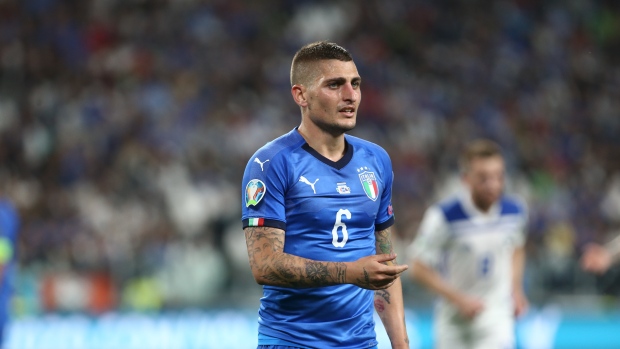Jun 10, 2021
Built from the back out? Not this Italy
Successful Azzurri teams of the past were known for their all-world defence, but at Euro 2020, Roberto Mancini's Italy plans to contend with its sterling midfield.
ESPN

Forget the old stereotypes. Successful Azzurri teams of yesteryear were known for uncompromising A-list defenders (think Fabio Cannavaro, Paolo Maldini, Franco Baresi or Gaetano Scirea) and lethal strikers (Paolo Rossi, Roberto Baggio, Pippo Inzaghi or Francesco Totti). Not this team. This one is all about the midfielders, a category that -- with some notable exceptions -- hasn't been Italy's strong suit in past tournaments.
But this is where coach Roberto Mancini can wallow in his strength in depth. From Inter's Nicolo Barella to Paris Saint-Germain's Marco Verratti, Sassuolo's Manuel Locatelli and Roma's Lorenzo Pellegrini, this side is teeming with two-way players. Pulling it all together is an old-school playmaker like Chelsea's Jorginho, who won the Champions League last month.
Whichever trio ends up starting -- and Italy are all but certain to go with a 4-3-3 formation -- will be tasked with implementing Mancini's current vision of football (he has evolved more than most over the years), which is based mostly around possession, passing and pressing. These "three p's" are designed to make the team proactive, rather than reactive, like in the past.
Part of it is the general direction of travel in the modern game: defend-and-counter may have worked well in the past (and may still work in knockout competitions), but few top sides play that way anymore. Part of it is simply playing to your strengths and masking your weaknesses, which, in Italy's case, were traditional areas of strength in the past.
Sure, at the back you'll still find the big names, but Giorgio Chiellini is now 36. Leo Bonucci is 34. The latter was benched for the former during Juve's late-season run and it's unlikely we'll see the pair together. They do have a hugely gifted goalkeeper, capable of taking the baton from the likes of Gigi Buffon (and before him, Walter Zenga and Dino Zoff), but Gianluigi Donnarumma is still just 22 and, more importantly, not in the best frame of mind. He turned down a contract offer from Milan, the club where he's been a regular from the age of 16, and is now a free agent, gambling that clubs would line up to sign him. They haven't -- yet -- and in the meantime, Milan signed his replacement.
Up front, there are no A-list stars -- though Federico Chiesa may get there one day and Nicolo Zaniolo might already be there if injury hadn't robbed him of the 2020-21 season and a shot at the Euros -- but there's a core of hard-working, gifted players with the ability to get hot and carry the team. All eyes will be on the center-forward position, where Mancini will likely choose between Ciro Immobile -- a goal-machine for Lazio, less so on the international stage -- and Andrea Belotti, a blue-collar type who hasn't scored from open play at club level since early February.
To succeed, Mancini will need one of those two (or, perhaps, 21-year-old Giacomo Raspadori, the budget Sergio Aguero) to convert the many chances Italy create these days. He'll need Donnarumma to be in the right state of mind (something he most definitely wasn't the last time his club future was uncertain, in 2017 at the U21 Euros), and he'll need the back line to hold up and not be judged against Italy defense of the past.
What he most likely won't have to worry about is his corps of young stars in the middle of the park.
